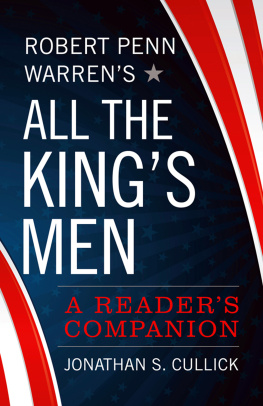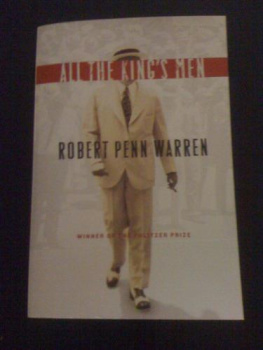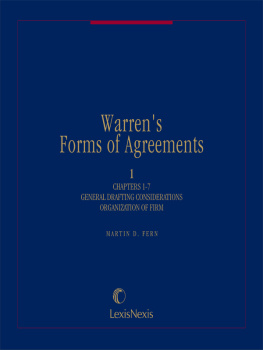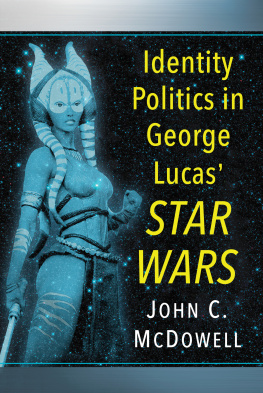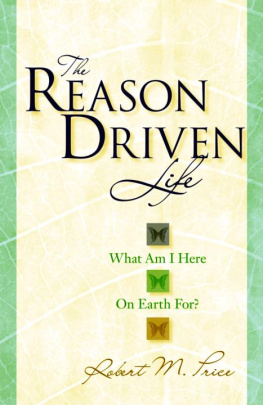Night Rider

Southern Classics Series
M. E. Bradford, Editor
Southern Classics Series
M. E. Bradford, Series Editor

Donald Davidson | The Tennessee, Volume I |
Donald Davidson | The Tennessee, Volume II |
Caroline Gordon | Green Centuries |
Caroline Gordon | None Shall Look Back |
Caroline Gordon | Penhally |
Augustus Baldwin Longstreet | Georgia Scenes |
Andrew Nelson Lytle | Bedford Forrest and His Critter Company |
Andrew Nelson Lytle | A Wake for the Living |
Thomas Nelson Page | In Ole Virginia |
William Pratt, Editor | The Fugitive Poets |
Elizabeth Madox Roberts | The Great Meadow |
Allen Tate | Stonewall Jackson |
Robert Penn Warren | Night Rider |
Owen Wister | Lady Baltimore |
Stark Young | So Red the Rose |
Night Rider

ROBERT PENN WARREN
with a foreword by George Core

Copyright 1939 by Robert Penn Warren
Copyright renewed 1966 by Robert Penn Warren
Foreword to this edition copyright 1992
by J. S. Sanders & Company
Published by arrangement with the William Morris Agency
on behalf of the Estate of Robert Penn Warren
All rights reserved. No part of this publication may be reproduced or transmitted in any form or by any means, electronic or mechanical, including photocopy, recording, or any information storage and retrieval system now known or to be invented, without permission in writing from the publisher, except written for inclusion in a magazine, newspaper, or broadcast.
Library of Congress Catalog Card Number:
92-082382
ISBN: 1-879941-14-7
Published in the United States by
J. S. Sanders & Company
P.O. Box 50331
Nashville, Tennessee 37205
Distributed to the trade by
National Book Network
4720-A Boston Way
Lanham, Maryland 20706
1992 printing
Manufactured in the United States of America
TO
DOMENICO BRESCIA
AND
DANIEL JUSTIN DONAHOE
IN GRATITUDE
Although this book was suggested by certain events which took place in Kentucky in the early years of this century, it is not, in any strict sense, a historical novel. And more particularly, the characters in this book are not to be identified with any actual persons, living or dead, who participated in those events.
Foreword
What good fiction gives us, Robert Penn Warren observes, is a powerful image of human nature trying to fulfill itself. He continues: Neither the economic man nor the political man is the complete man: other concerns may still be important enough to engage the attention of a writersuch concerns as love, death, courage, the point of honor, and the moral scruple. A man has to live with other men in terms not only of economic and political arrangements; and he has to live with himself, he has to define himself. Although Warren is responding to Hemingway and his fiction in this passage, what he says applies equally well to much of his own fiction, including his brilliant first novel, Night Rider (1939).
Percy Munn, the protagonist of the novel, tries to define himself in economicand, more especially, politicalterms; but he is far more engaged by the roil and ruck of human possibility that Warren limnslove, death, courage, the point of honor, and the moral scruplethan he is by mere economic considerations or even by political necessity. Of course no one can compartmentalize every urge and pressure, every idea and attitude and emotion, in his or her life; and any person, real or fictive, will be subjected to the pressure of events beyond his or her control and understanding. Mr. Munn finds himself buffeted by events throughout the action.
The opening sequence of the novel dramatizes the blind force of circumstance in a simple yet beautifully dramatic way as Munn, standing in a train pulling into Bardsville, Kentucky, finds himself caught in the press of moving bodies as the train brakesfeeling the grinding, heavy momentum. The gathering force which surged up the long aisle behind him like a wave took him and plunged him hard against the back of the next man. Munn has been unable to brace himself properly against that powerful blind force. Mr. Munn never finds his moral bearings and, unable to brace himself, continues to be buffeted by human circumstance. In that image, caught in the action of the packed lurching train, Warren dramatizes a principal theme in Night Rider: Mr. Munn again resented that pressure that was human because it was made by human beings, but was inhuman, too, because you could not isolate and blame any one of those human beings who made it.
One of the ironies of Munns situation is that he is not only an attorney but a leader in the movement in which he finds himself enlisted; yet, despite his profession and his position of authority, he is unable to follow a course consistently moral and right. There are many instances of this failing, but the most obvious involves his defense of Bunk Trevelyan, who has been charged for murder. Munn, in defending Trevelyan against what he thinks are groundless charges, subverts the judicial process and causes an innocent man to be hanged. Later he realizes Trevelyan is more nearly a fascist than a representative example of the common man, and Munn recognizes that, despite his good motives, he has acted wrongly. Trevelyan, he perceives, is in some respect the dark side of himself, his brutal alter ego. And in the same manner Mr. Munn reacts strongly against Senator Tolliver because he fears that the opportunistic Tollivers weakness, his tendency to make accommodations and his inability to remain true to a cause, will infect and undermine Munn himself. On the other hand Munn betrays Mr. Christian, and he in turn is betrayed by Professor Ball. Only Captain Todd remains true to himself and his principles as the Association of Growers of Dark Fired Tobacco reels out of control, moving from a democratic to a revolutionary organization, and finally standing for much the same values as those its makers originally bridled against when they organized themselves to fight the vast power of the tobacco companies that colluded against the growers by holding down the wholesale price of dark tobacco. After the growers march on Bardsville and fire the warehouses there, this world goes mad, with the night riders attacking not only the public enemies of the Association but their own private enemies. One is reminded of the Reconstruction South and of contemporary Ireland, but the larger significance of the novel suggests the beginnings of the Third Reich and the Soviet Union as democratic ideals are set aside for totalitarian ends.
Next page

